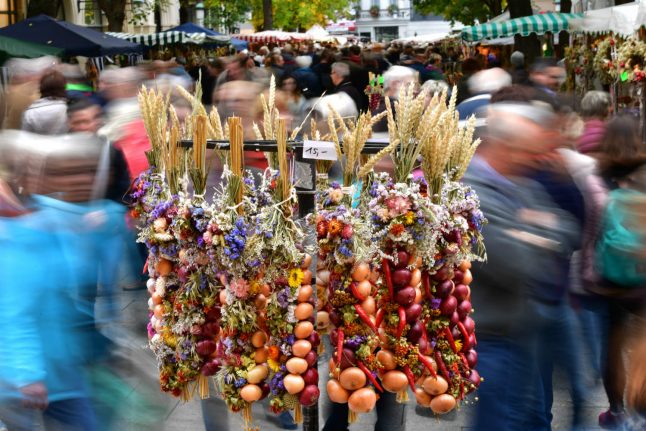German Grape Harvest Festival, Neustadt, October 2nd-14th

The Neustadt parade is the largest wine parade in the world. Photo: DPA
This festival takes place at the heart of the German wine route on the first and second weekend of October every year. It is the second largest wine festival in the world.
The main attraction of the festival is the winemakers parade which first wound its way around the streets of Neustadt in 1909. Now, 100,000 visitors are expected to attend the parade which will also see the celebration of the crowning of a new Palatinate wine queen and a new German wine queen.
Through its vast size and extended programme, the Neustadt wine festival shows that Germany takes wine, not just beer, seriously.
Exhibit: Prenzlauer Berg before, during and after the Mauerfall, Berlin, starting October 4th

The Ernst Thälmann memorial, one of the sites featured in the exhibit. Photo: DPA
It’s hard to tell that the increasingly posh Berlin neighbourhood of Prenzlauer Berg once belonged to former East Germany. Yet, as Germany celebrates 30 years of the fall of the Berlin Wall this November 9th, a new exhibit has opened to show how the central Kiez was a catalyst for change, starting from the 1970s on.
Museum Pankow’s permanent exhibition, which opened on Friday, shows where and how counter movements to communism started, leading visitors outside to many buildings, parks and open spaces where ordinary people peacefully pushed for the landmark events of 1989.
Ludwigsburg Pumpkin Festival, Now-November 3rd

Every year “Germany's largest pumkin” is honoured at the festival. Photo: DPA
Set in the beautiful grounds of Ludwigsburg Palace, this is the largest Pumpkin Festival in the world. It is not only a festival for children, but for adults too, with gourmet food and drinks (all with the seasonal squash as an ingredient, of course) alongside children's entertainment and activities such as storytelling and a Halloween carving tent.
There are more than 450,000 pumpkins on display at the festival alongside an extended programme of events. Sadly the pumpkin canoe regatta has already taken place, but there is still much more to come throughout October including the all important pumpkin weigh offs and and giant pumpkin carving competitions.
Weimar Onion Festival, October 11th-13th
A video by the city of Weimar for the famous 'Zwiebelmarkt'.
This year marks the the 366th edition of the Weimar Zwiebelmarkt, the oldest folk festival in Thürigen. There are about 600 stalls selling various onion related wares, alongside a whole programme of music and events.
Highlights of the festival include trying the special onion cake, the crowning of the Zwiebelmarkt Queen, and the display and sale of Zwiebelzöpfe, braids made of onions and decorated with flowers. On the Saturday of the festival there is even a city run including a children's race, a 10km race and a half marathon. The route runs right through – not surprisingly – the middle of the Zwiebelmarkt.
Cannstatter Volksfest, Stuttgart, Now-October 13th

A tent inside the Cannstatter Volksfest. Photo: DPA
Munich’s Oktoberfest is no doubt the most well-known beer extravaganza. But if you miss it before its final weekend this Sunday, October 6th, why not check out a (slightly) more laid-back festival in southern Germany: Stuttgart’s Cannstatter Volksfest.
READ ALSO: Forget Oktoberfest. Here's why you should visit Cannstatter Volksfest instead
Running through mid-October, it offers a variety of amusement park rides for kids and adults alike. Keeping the southern German spirit alive, there are also a variety of themed tents with long tables, serving a variety of brews in impressively large mugs. Check out the Schwabenwelt for a taste of Baden-Württemberg’s famously rich cuisine or the Almhürttendorf tent for a bit of Alpine ambiance.
Frankfurt Book Fair, Frankfurt am Main, October 16th-19th

A visitor to the Frankfurt book fair in 2017. Photo: DPA
The perfect match for Germany's book lovers, the Frankfurt Book Fair is the world's largest book trade fair. The first three days of the festival are only open to those in the business, but the weekend at the end of the festival is open to the public and is well worth a visit.
The first book fair in Frankfurt was held in 1454, and it remains to this day one of the most significant book fairs in the world. Along with the fair, there will be a book festival throughout the city, including readings and poetry slams at venues such as the English Theatre.
Burg Frankenstein Haunted Castle, Darmstadt, October 25th-November 10th
A post shared by Halloween Burg Frankenstein (@halloween.burgfrankenstein) on Sep 30, 2019 at 11:30am PDT
By now, most of us know have the date of October 31st in mind for the UK’s planned departure from the EU. But there’s another event – that many people would argue is even scarier – taking place on this day: Halloween.
At ‘Burg Frankenstein’, you can feel creeped out in a 1000 year old castle ruin, complete with 12 “scare zones” and 100 costomed creatures. While Halloween has only been picking up in popularity over the past few years in Germany, this scary spectacle has spooked out guests since 1977. The well-known castle stands on a 370 metre high foothill of Langenberg near Darmstadt.




 Please whitelist us to continue reading.
Please whitelist us to continue reading.
Member comments